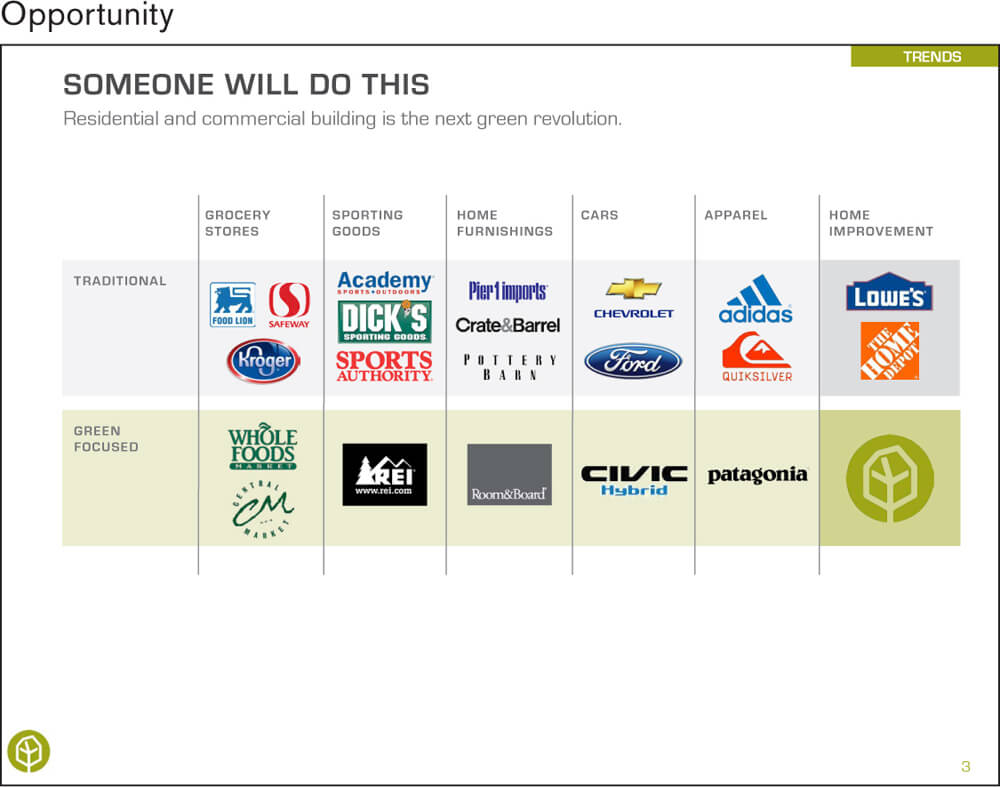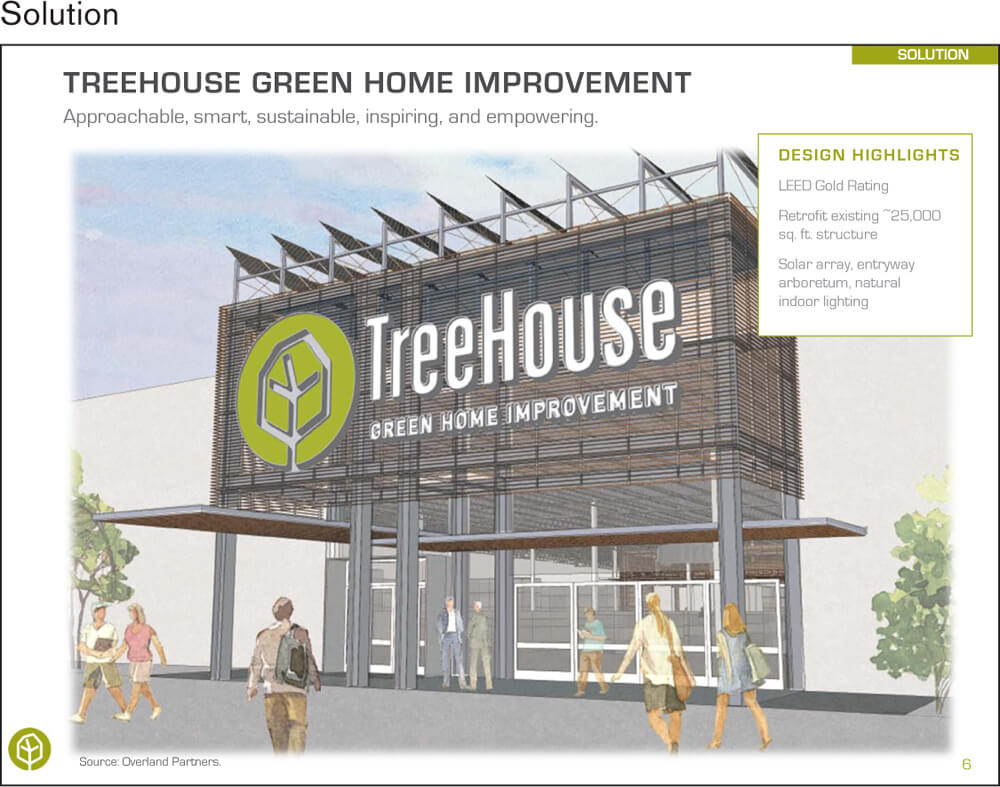6
Actual Pitch Decks
You’re about to see what only venture capitalists and investors typically get to see: excerpts from the actual pitch decks and fundraising strategies of fifteen successfully funded startups. For this chapter, we profile ventures from across multiple sectors, stages, and cities. Combined, these ventures have raised well over $100 million.
We debated whether to include this chapter at all; people find it nerve-racking to show their investor decks. But in the spirit of giving back, the founders featured here have chosen to offer you something that they normally never show anyone. We are deeply grateful for their commitment to advancing entrepreneurship.
As these profiles illustrate, when it comes to fundraising, there is no one-size-fits-all template, but there are patterns and principles to identify. Aside from the founders’ own comments and advice, we let their decks speak for themselves.
Drum roll please . . . Here are the strategies and materials of fifteen ventures that crushed it at raising money.
Able Lending
Low-interest loans to small businesses.
Founding team: Evan Baehr, Will Davis
Location: Austin, TX
Funding round: Series A
Market category: finance; banking
Able is a set of engineers, math geeks, designers, and business consultants that together built a new way to fund “the Fortune 5 million”—the 5 million small businesses in the United States that create two-thirds of all jobs, but can’t access reasonably priced capital. The deck is clean with simple, to-the-point visuals. It’s also text-heavy, with the bottom third of the slide often used to explain the specifics of the Able model. This structure, combined with large and phrase-length titles, lets the reader understand each slide quickly, but then dig in if and when they want more.
Common Mistakes Founders Make
“Their decks are usually terrible. They wait to meet investors until they need money. They are too tense and fail to build positive rapport with investors.”
Advice
“Build a deck early and then use it to refine your business model over time.”
Redo
“I’d find a way to answer some of the most common objections early on. Also, we often ended up scrapping the deck in our pitches and instead writing four core graphs on the board. The deck should start with those.”
Slide Investors Focused on Most
“The amortization slide, though a bit technical, is actually the core of the model.”

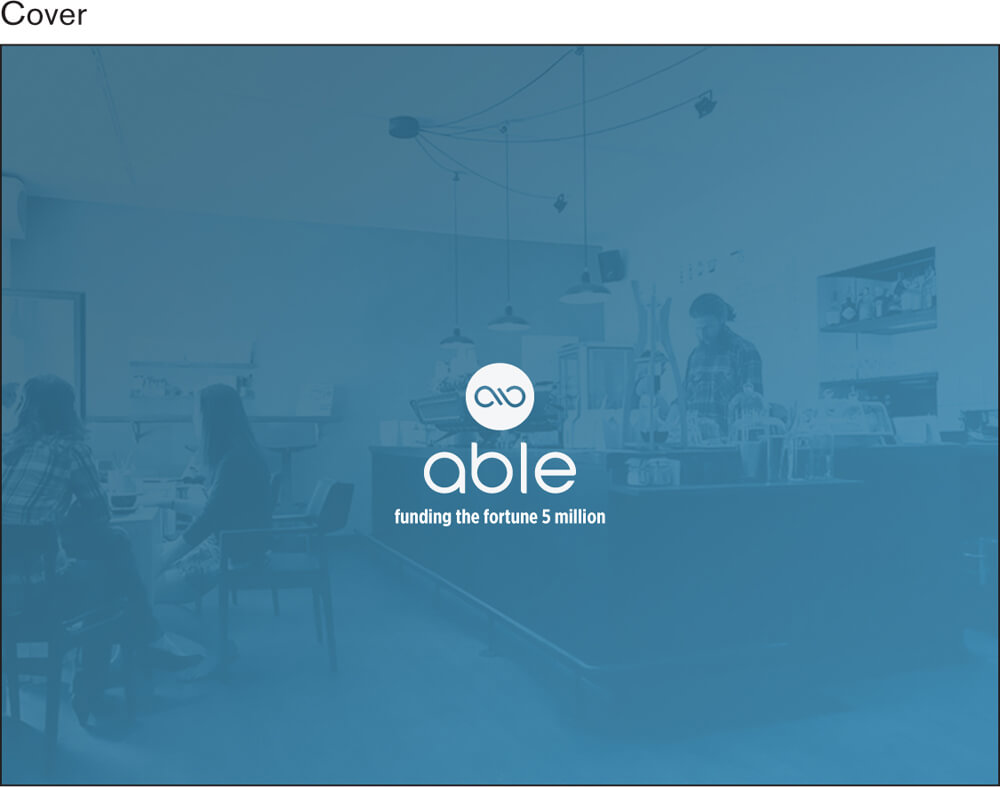







Beacon
All-you-can-fly subscription air service.
Founding team: Wade Eyerly, Cory Cozzens, Reed Farnsworth, Ryan Morley
Location: New York City
Funding round: Series A
Market category: travel
Three of the four founders of Beacon had already built one company that was the first to apply the subscription model to aviation—Surf Air—and led the first three rounds for the company that has now raised $88 million. In their deck, the team struck an excellent balance in communicating the right kind of information simply and effectively.
Common Mistakes Founders Make
“They think that success raising money defines them as entrepreneurs. It doesn’t. Build your business. This bleeds into the process, as they hyperfocus on new metrics that they can share. The problem is that no amount of data will compel an investor to invest. What you have to do is tell a narrative. You have to sell the story that you’re onto something big and that you’re the team that can do it.”
Advice
“Know what you’re good at and do it. Know what you’re not and be honest about it. Don’t gloss over failures, holes on your team, things that didn’t work out, etc. Investors don’t care that you took a swing at something and it didn’t work out. They also aren’t worried that your team has holes in it. They do care that you know it, however. If you’re so focused on having all the answers, you’ll come across as unaware of the challenges ahead of you.”
Redo
“I would spend less time building it. Making the deck is a good exercise for founders and helps focus your narrative and your thinking, but no one invests in a deck.”
Slide Investors Focused on Most
“I’m not sure investors even look at it. I use the deck as an e-mail attachment prior to meeting with them and never actually open it when we’re together. I know the information inside out, so we just have a conversation. I can answer the questions they actually have, as opposed to driving the conversation to answer the questions that I anticipated them having when we built the deck.”









Connect
Global messaging platform.
Founding team: Ryan Allis, Caen Contee, Anima Sarah LaVoy, Zachary Melamed
Location: San Francisco, CA
Funding round: Series A
Market category: mobile; messaging
Connect is cofounder Ryan Allis’s second venture. He helped grow his first startup, iContact, to 300 employees and $50 million in annual sales and sold it in 2012. Ryan’s commitment to relationships has led him to become one of the most well-connected entrepreneurs around. Connect focused on building a business with significant traction before they raised money, which is reflected in their deck.
Common Mistakes Founders Make
“Raising too much money, too early on. I often see companies raising tens of millions of dollars now, before they’ve proven the value proposition, which makes their monthly net losses too high and forces them to continue to raise more and more money. Also, entrepreneurs don’t take the time to understand the environment in which they’re operating. If you don’t understand your industry’s history and can’t tie that together with what you’re building today, then investors will think that you haven’t done your research.”
Advice
“Keep your costs low and raise very little money, under $50,000, until you know that you have something. Unless you have $10,000 a month in recurring revenue or 10,000 daily active users, don’t raise outside capital. Take consulting gigs or freelance work on the side; work as a barista; keep your day job; whatever you have to do to keep your costs super-low until you have product-market fit and active engaged users. Once you have that, then you ramp up.”
Redo
“I would have waited even longer to raise our first outside round of capital. We had 1.5 million users when we raised our Series A. However, we still had a few more risks to get past in order to achieve true product-market fit. In hindsight, I would have waited to invest in marketing and advertising until we had retention really nailed.”
Slide Investors Focused on Most
“ ‘Monthly Active User Trends’ and ‘Total Usage Trends.’ ”




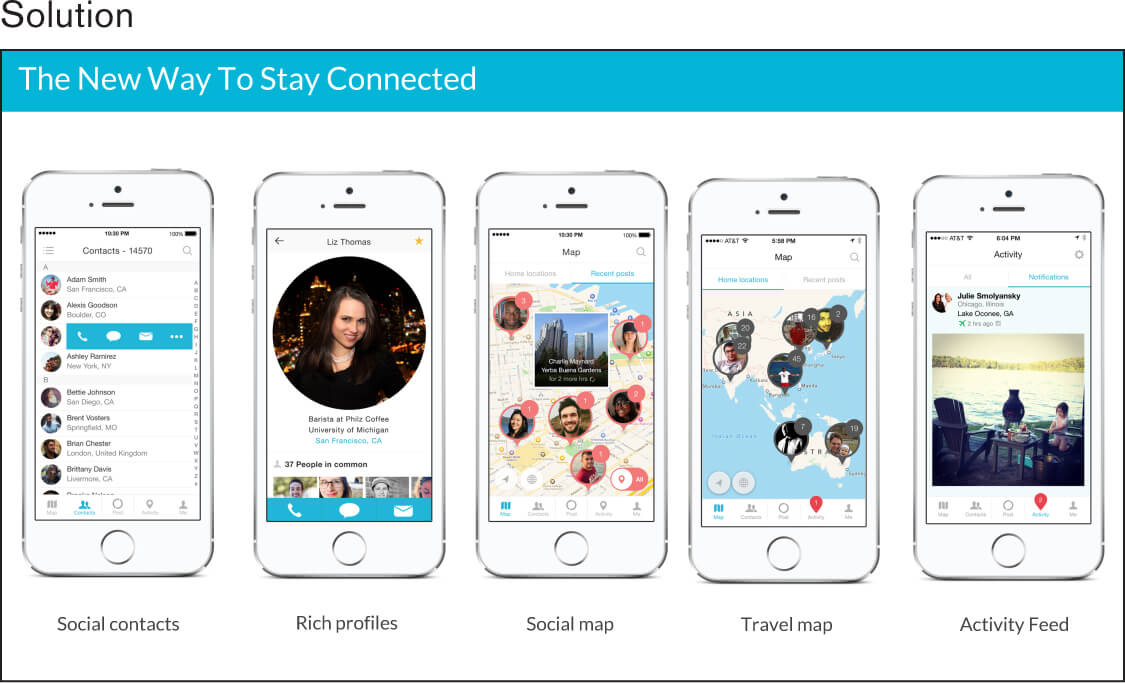




Contactually
Contactually helps professionals turn relationships into results.
Founding team: Zvi Band, Jeff Carbonella, Tony Cappaert
Location: Washington, DC
Funding round: Series seed
Market category: sales and marketing, customer relationship management
Contactually is a customer relationship management software that aggregates online communication and interaction in order to help users maintain relationships with important contacts. Cofounded by Zvi Band and Tony Cappaert, Contactually got an early boost in 2011 when it was backed by the accelerator 500 Startups. The team then used that momentum to raise $3 million over two rounds of funding. The deck relies on a combination of short, digestible copy and graphics.
Common Mistakes Founders Make
“Don’t pitch everyone. Focus just on the investors for whom your company is in their wheelhouse. Also, don’t be afraid to ask for a clear path forward and a yes or no.”
Advice
“Enjoy it. Every part of the company, including fundraising, should be a fun and exciting experience. If you are hating it or feel your back is up against the wall, change things.”
Redo
“I would focus a lot more on the narrative. We spent a lot of time talking about data and checking the boxes of what’s in a VC pitch. But we spent very little time thinking about crafting a concise narrative for what we’ve built and where we’re going.”
Slide Investors Focused on Most
“Product, market, competition.”









DocSend
DocSend tells you what happens to your documents after you send them.
Founding team: Russ Heddleston, Dave Koslow, Tony Cassanego
Location: San Francisco, CA
Funding round: Series seed
Market category: software
Armed with computer science degrees from Stanford and experience working at companies like Facebook and Dropbox, Russ Heddleston, Tony Cassanego, and Dave Koslow founded DocSend, a service that tracks everything that happens to a document after you share it. The service became a hit among people sharing pitch decks themselves. DocSend’s deck is heavy on copy and uses neutral colors to avoid drawing attention away from the words.
Common Mistakes Founders Make
“It’s all about quality, not quantity. Create a list of thirty investors who you actually want to meet with. Set up at least twenty meetings in a two-week period. Do this at least a few weeks out. If you can’t get any of those twenty to invest, you need to change something before you try again.”
Advice
“Focus on your strengths. Be sure to tell investors why you’re different and be sure to bring something unique to the table. This could be a hundred interviews with potential customers, it could be 10,000 signups, or it could be your background of ten years building machine learning software.”
Redo
“The design on this deck is atrocious. Our newer deck looks a ton better. We also have a lot more detail on our target user.”
Slide Investors Focused on Most
“The team slide was viewed the longest on average, followed by the competition slide.”



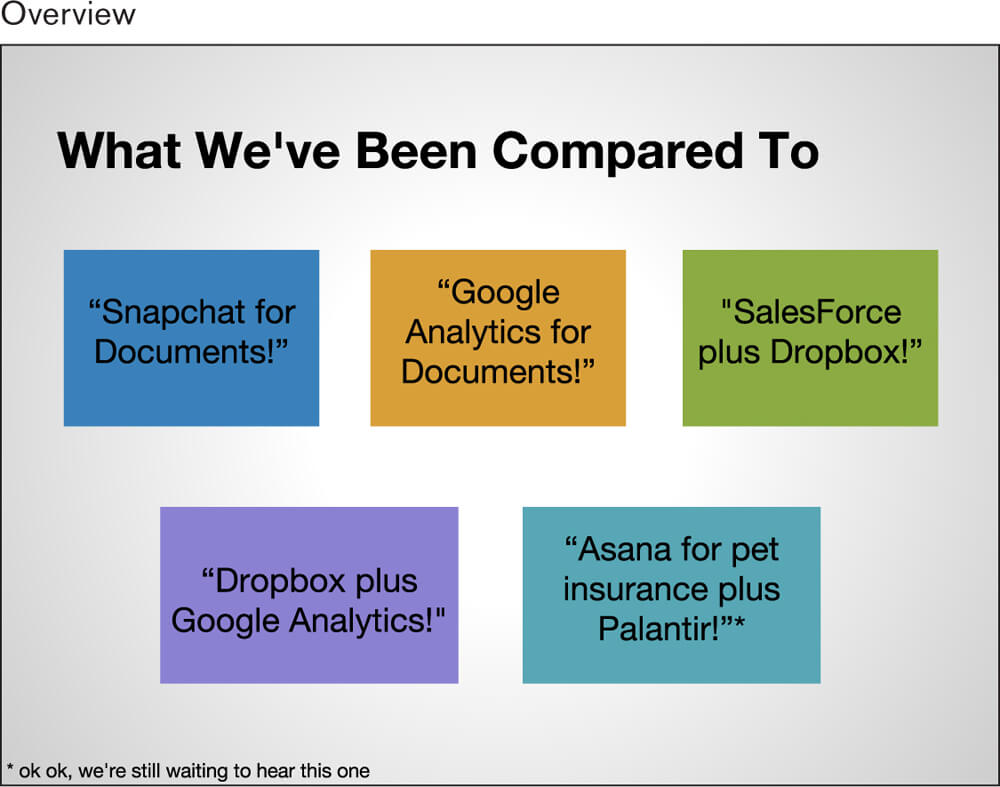





First Opinion
A qualified doctor available 24/7 at no cost.
Founding team: McKay Thomas, Jay Marcyes
Location: San Francisco, CA
Funding round: Series seed
Market category: parenting; health and wellness; mobile health
First Opinion lets parents, specifically young moms, track their children’s health issues and gives them the ability to connect them with a doctor when necessary. Founder McKay Thomas included pictures of him and his children in the deck, making the story more personal and compelling.
Common Mistakes Founders Make
“Build relationships; don’t pitch your business. I have fond memories with nearly every person who invested in my seed, and that’s no coincidence. Keep your deck in your bag; rather, make a new friend with the person across from you. You’ve got thirty minutes to make yourself memorable, and it’s not in your deck. It’s you. You are what makes your business special at the seed stage. Make sure whomever you’re meeting with feels that.”
Advice
“Be the most genuine, thoughtful, loving version of yourself. And speak with so much passion that you’ll be the only person on their mind for the next ten years. There’s a lot of talk in this book about decks, but my lasting advice is to keep your hands on the table, not on your iPad. Keep your eyes locked on the person you’re meeting with, not on a slide. Talk about them and their family and what they find interesting, not your business. Make them bring up your business. Be honest. Be yourself. Set out to make a friendship, not a business deal, and you’ll likely find both.”
Redo
“I’d add more substantiated data about the target market (new parents) and the total addressable market (urgent care, primary care). I’d also shorten the explanation of the product and make it even more emotional.”
Slide Investors Focused on Most
“ ‘The Market in the Middle’ slide explains what I intend to accomplish with First Opinion and at the same time explains why no one has created this product before. When you look at the market size on either end, it’s clear there’s a ton of value to be captured.”









Freight Farms
Everything to allow anyone, anywhere, to become a producer of local, sustainable greens and herbs.
Founding team: Brad McNamara, Jonathan Friedman
Location: Boston, MA
Funding round: Series A
Market category: Internet of Things; mobile commerce; agriculture
You might not think of Boston as farmland, but Freight Farms cofounders Brad McNamara and Jonathan Friedman created a product that enables anyone to grow farm-fresh produce year-round. By building and selling their product before trying to raise capital, they were able to prove there’s a market for what they were making. Clean, crisp pictures combined with straightforward, short copy help grab and keep a reader’s attention and let the product speak for itself.
Common Mistakes Founders Make
“All the same mistakes we made. Listening to the press, reading your own clippings (or lack thereof), not listening to the right people, listening to the wrong people. Biggest mistake (we avoided this one) is losing sight of what you ultimately are going to accomplish. To convince people to invest, you’ll need to do a lot of nitty-gritty detail stuff, business modeling, etc., that can derail your original plan. Try to check back in with your cofounder often enough and call each other on the BS. To that end, the best advice is to have a great cofounding team.”
Advice
“Build and sell it first, then look for money. If you can sell your dream and prototype for real money, it’s much easier.”
Redo
“I wouldn’t change anything; all the information and style were reflective of where we were as a company at that stage.”
Slide Investors Focused on Most
“The slides that provoked the most discussion were the sales, business model, and customer economic returns slides.”









Hinge
The dating and relationship app for young professionals.
Founding team: Justin McLeod
Location: New York City
Funding round: Series seed
Market category: dating and social discovery
Founded by Justin McLeod, Hinge is the dating app for relationships, which works by introducing users to friends of friends. Hinge’s deck opens by arguing for why mobile dating apps would be increasingly popular. We like the way Hinge goes beyond basic user numbers to show traction and focuses on visualizing their most important metrics: frequency of use and retention over time.
Common Mistakes Founders Make
“Entrepreneurs are often too willing to talk to any investor, which is not only a waste of time, but worse, it shifts the power dynamic in favor of the investor. Investing is like dating; it works better when your partner feels lucky to have you.”
Advice
“No matter the stage, entrepreneurs should narrow the field, make the deal seem exclusive, and make investors feel that they are being chosen not just because they’re the only ones willing to fund.”
Redo
“I would have sold more of a vision up front about what we believed the dating app market would look like. This was mid-2013, before dating apps were popular. A better case could have been made that most single people would be using dating apps by 2015.”
Slide Investors Focused on Most
“Investors spent the most time challenging the size of the market, both in terms of number of people and in terms of dollars, given that ‘Match had already saturated the market.’ Our belief was that the market would be an order of magnitude larger than it was in 2013, and that Match would NOT be the prime player.”









Karma
Get online easier than ever before by bringing Wi-Fi with you, everywhere you go.
Founding team: Stefan Borsje, Steven van Wel, Robert Gaal
Location: New York City
Market category: internet service providers; telecommunications; mobile
In early 2012 on a trip to New York, Steven van Wel was talking about Karma over lunch with a friend. Suddenly, this crazy guy walks up, tells him “hi,” and walks off. A few hours later, Steven got an e-mail from David Tisch, at the time, the managing director of Techstars NYC. “You don’t know me,” David wrote, “But I just met you and you should move out to New York to join Techstars.” That was the start of Karma’s fundraising journey. Karma’s deck does a lot in a small amount of real estate. Consistent formatting (big title at the top, main visual and content in the middle, and extra data at the bottom) keeps the deck clean and easy to digest.
Common Mistakes Founders Make
“A commitment isn’t closing. Till the money is in . . . keep pitching. Maybe always means NO.”
Advice
“Always follow up after every meeting. Send out weekly updates to everyone you’ve met with.”



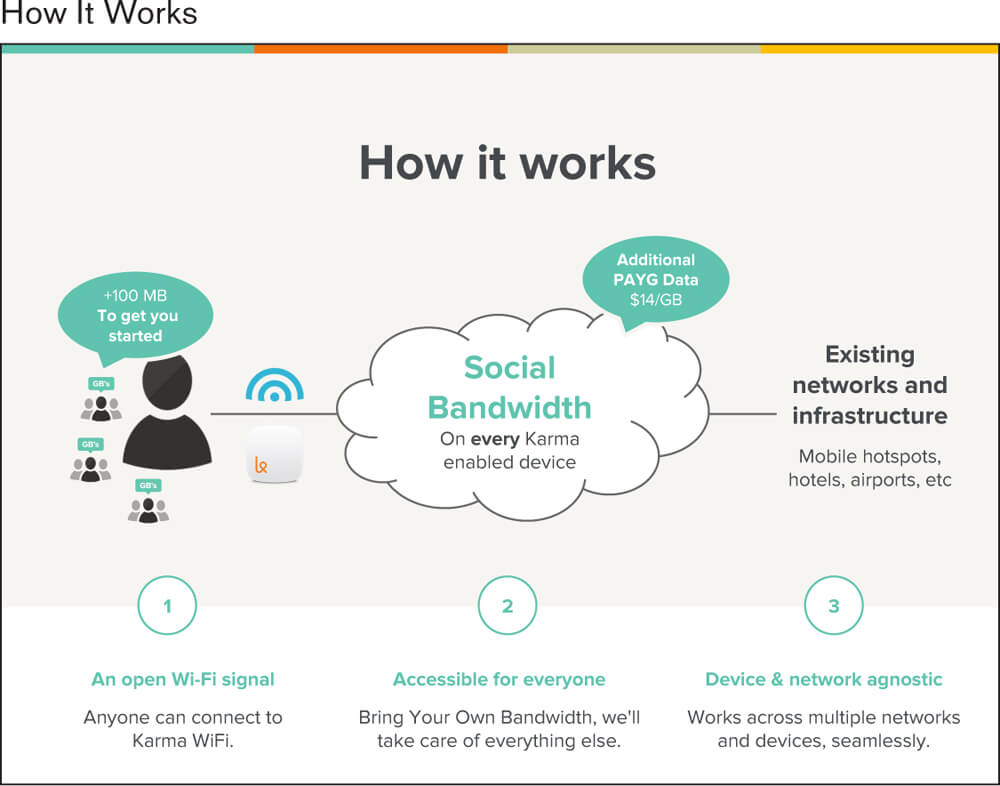





Man Crates
Bragworthy gifts for men.
Founding team: Jonathan Beekman, Sam Gong
Location: Redwood, CA
Funding round: Series seed
Market category: e-commerce
Man Crates is a beautiful example of the power of brand and customer experience. Out of what would seem like an overcrowded space—online gift-giving—cofounder Jonathan Beekman has built a massively profitable business by focusing on building experiences people love. We like the “Customer Satisfaction” slide in particular. It shows Man Crates’s Net Promoter Score stacked side-by-side with some of the world’s most well-known brands.
Common Mistakes Founders Make
“It’s very easy to waste time answering questions from investors who aren’t really all that interested in investing. Some investors would rather get a free option on investing than just say no. You should push for a yes, but absent that, push for a no. Ignore anyone who says “maybe” without giving you specifics on when they’ll make their decision; for the most part, these investors are a waste of time. Focus on those who have yet to say yes or no.”
Advice
“Once you decide to start raising, focus on nothing else. It’s tempting to devote ten hours a week to fundraising, but it’s more like an eighty-hour-a-week full-time job. The faster you close, the faster you can get back to building your business. So plan to be fundraising for twice as long as you think it’ll take, and if you close before then, consider yourself lucky.”
Redo
“I’d spend a bit more time on the formatting and polish. I nearly always present this deck in person, so as a stand-alone document, it’s not as useful as it could be. Before sending to investors, I’d trim a few of the slides so the deck was more of a teaser intro to help facilitate a face-to-face meeting.”
Slide Investors Focused on Most
The financial slide.









Reaction, Inc.
Designs and manufactures humanitarian-focused products.
Founding team: Michael McDaniel
Location: Austin, TX
Funding round: Series seed
Market category: Clean technology; hardware and software
Reaction is a design-centered venture, and their deck reflects that. What could be thought of a sleepy industry (“temporary housing”) is made fascinating by a big idea communicated through beautiful design and compelling market data. All physical product companies should emulate their excellent use of product photography in this deck. Moreover, Reaction’s social mission comes through subtly but strongly.
Common Mistakes Founders Make
“(1) Not telling a compelling story with a long-term vision. Create a company with a future; (2) Not doing dry or practice runs of their pitches before going on the road; (3) Wasting time with pitch competitions or pitching to the wrong audiences in general.”
Advice
“There are lots of creative ways to raise funds these days, so make sure that venture capital is the right funding vehicle for your needs. You are selling off a part of your company, your dream, and your work, and introducing a lot of new voices in exchange for capital. Only go down this route as a method of last resort or with the certainty that a raise will get your company where it needs to be. Then raise only what you need and at a valuation that you can live with forever. Remember, fundraising is not the end game; it is just the beginning.”
Redo
“I would add a product road map slide to show the vision and ambition of the company over a seven- or even a ten-year time span. This one slide would have told investors that we are not a flash in the pan or that we would not get bored with things sixteen months in.”
Slide Investors Focused on Most
“Competitive landscape.”





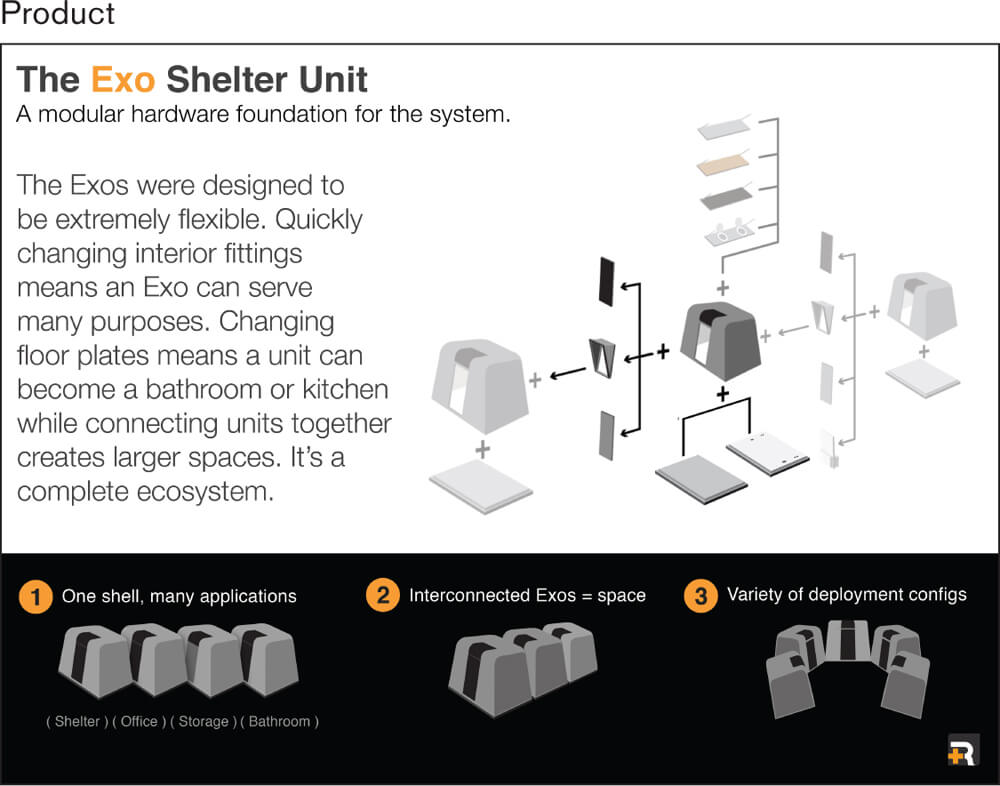

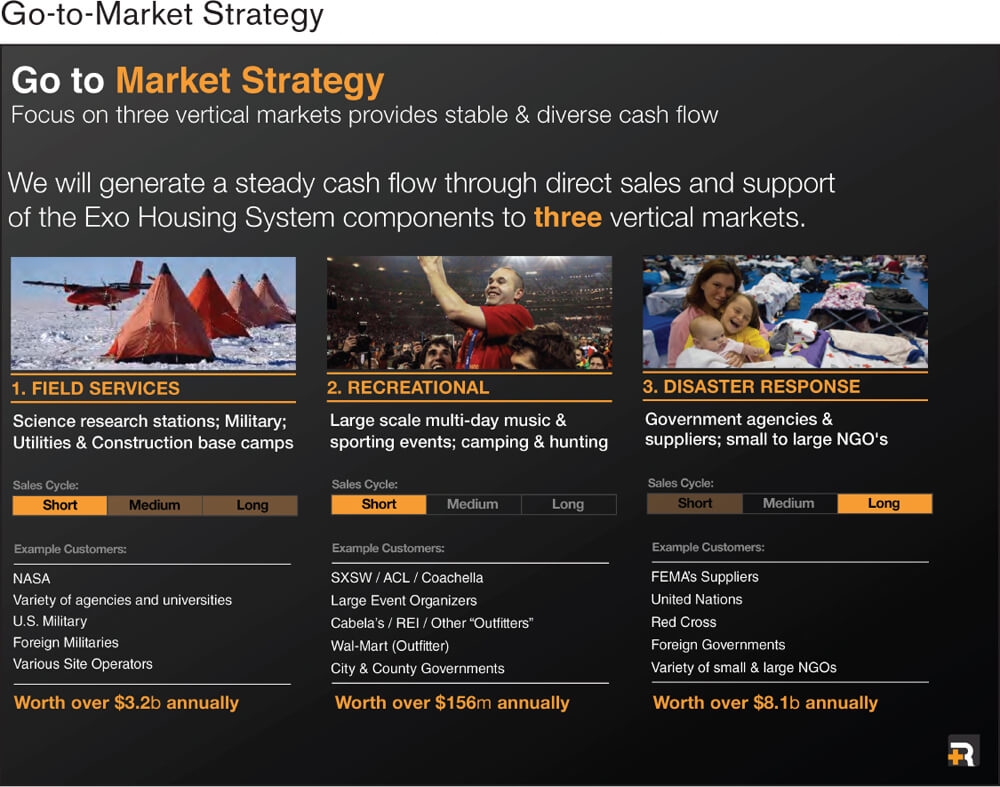

Shift
Takes care of every step in buying or selling a car. Better deals, real advice, and free on-demand test drives or appraisals.
Founding team: George Arison, Christian Ohler, Minnie Ingersoll, Joel Washington, Morgan Knutson
Location: Santa Monica, CA
Funding round: Series A
Market category: technology
Shift’s deck opens with a description of each founding team member’s accomplishments—one of Shift’s key strengths. The minimalist design reinforces their mission to simplify a complex and broken process. We love their use of full-bleed imagery and focus on showing the product. Finally, the photography of the filled car garage—the “hub”—reminds that reader that this is not merely a vision—it is live.
Common Mistakes Founders Make
“(1) Lots of CEOs think that valuation drives how much you raise. In reality, it’s how much you raise that drives the valuation; (2) Optimize for raising more money than you need; do not optimize for dilution. At an early stage, raise thinking that you will have no revenue for eighteen to twenty-four months; (3) Don’t focus on the funds, focus on partners at those funds; what matters is who you are working with day to day.”
Advice
“Focus on the people you will be working with, more than any other optimization. In my view, the team is the most important and awesome thing about Shift. I have incredible cofounders, both technical and operational, without whom none of this would have been possible. The biggest thing is team. Bring onboard awesome team members, before you do anything else.”
Redo
“I was actually pretty happy with the deck, so not much to change, especially since the final version has some edits from VC feedback.”
Slide Investors Focused on Most
“Team and product vision.”


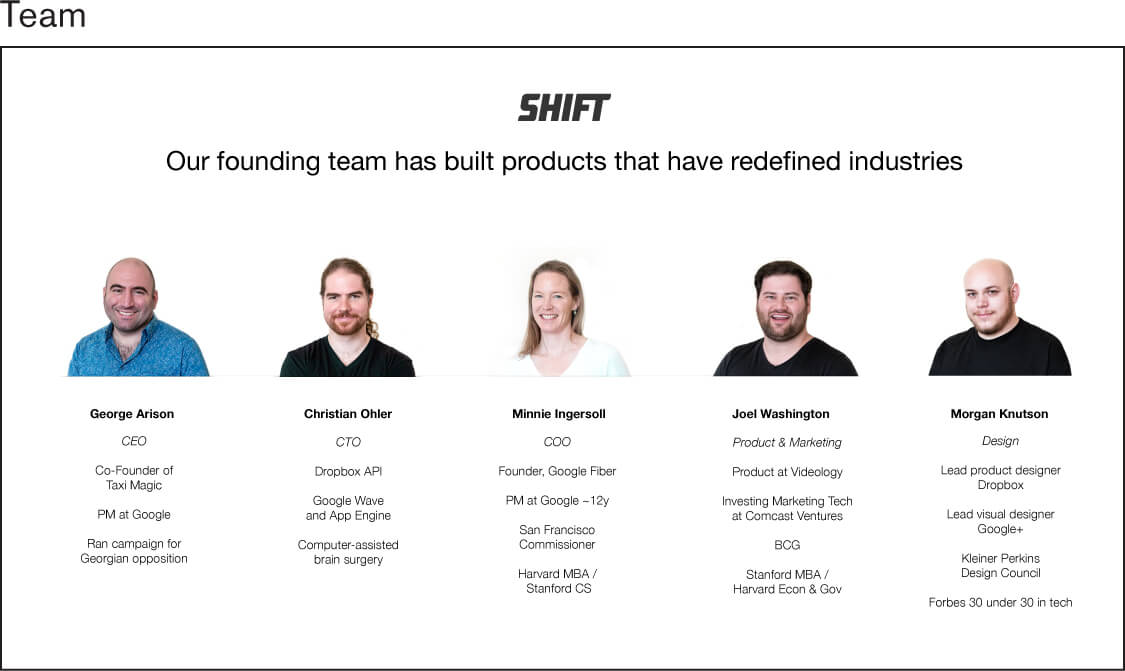






SOLS Systems
Dynamic, custom insoles engineered to change the way you move.
Founding team: Kegan Schouwenburg, Joel Wish
Location: New York City
Funding round: Series B
Market category: medical devices; fashion; 3D printing
SOLS is an orthotics startup with a big vision: to revolutionize manufacturing. The deck is beautiful. We love their use of imagery and negative space. Succinct, provocative copy fills the center of the slides. We also like how they use darkened images or faded images to fill the background.
Common Mistakes Founders Make
“Being self-critical. Raise the right amount of money for what you want to achieve. Too much, too soon can be just as bad as too little, too late. Not realizing that ‘maybe’ almost always means no.”
Advice
“Early-stage investing isn’t rational. It’s a mix of market trends, relationships, adrenaline, and appetite for risk. No matter how good your hockey stick looks, no one knows if your startup will succeed or fail. Get comfortable being uncomfortable, and take people on the journey. If you’re doing your job, your startup will outpace you. It’s OK. This doesn’t mean you’re getting fired. No one expects you to know every job, but they do expect you to hire people who can. Doing this well will make or break your company, your schedule, your culture, and ultimately, your success. No pressure. Do the best you can today, and do better tomorrow.”
Redo
“My approach to forecasting, focusing more narrowly on key performance indicators and less on vanity metrics and hockey-stick growth. Market aside, a startup’s trajectory is a direct reflection of the levers you pull, how hard you pull them, and in what order.”
Slide Investors Focused on Most
“Most often we talked through the deck without actually focusing or even looking at the slides. Very rarely did I find myself pitching in the traditional sense.”





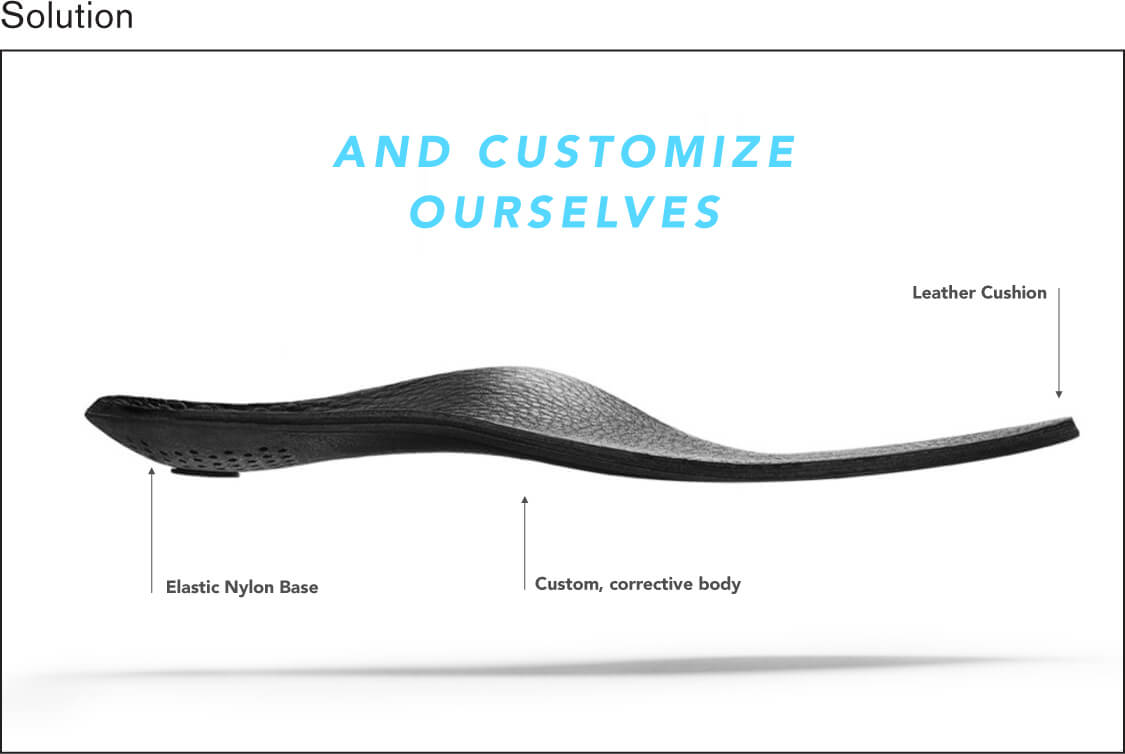

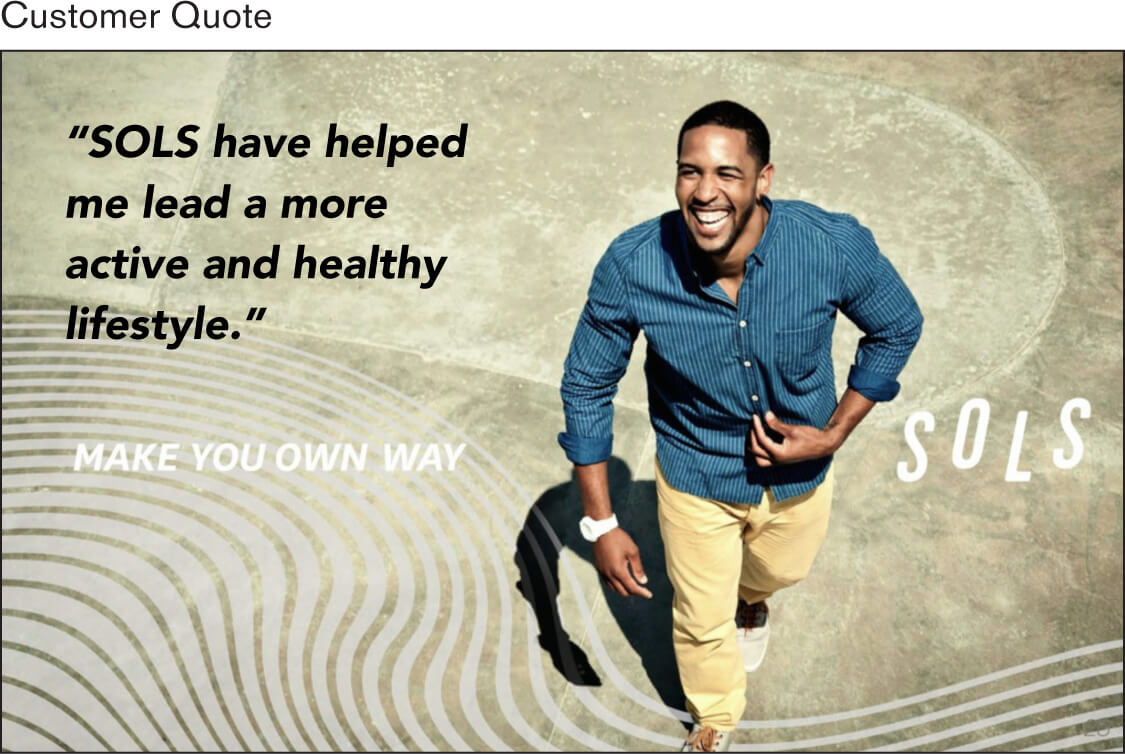

Tegu
Tegu is a magnetic wooden alternative to LEGO.
Founding team: Will and Chris Haughey
Location: Darien, CT
Funding round: Series B
Market category: toys
Tegu is a toy company with a powerful story. Founders Will and Chris Haughey created Tegu to be a socially driven company, focusing on job creation for the poor in Honduras while also building a profitable business. As a result, they attracted a certain profile of investor who both believed in their mission and the investment opportunity. Like their magnetic wooden blocks, the Tegu deck strikes a perfect balance of beauty and utility.
Common Mistakes Founders Make
They spend too much time preparing information. In the end, people invest in concepts and people that they trust. It’s also easy to waste time with prospects who don’t really have experience in investments of your risk profile.
Advice
Your goal is to get the person across the table to conclude for themselves “this could be huge.” After that, it’s just the details of how much they’ll commit. Plan for delays and always be closing. Time kills deals.
Redo
I would add a Use of Proceeds slide. I’d probably also add a more robust competitive positioning slide so outsiders to the industry could understand it quickly.
Slide Investors Focused on Most
Investors don’t spend much time on slides, but if I had to pick, it would be the financials. Investors often asked, “So, how does this thing make money?”









TreeHouse
Category-redefining home improvement company focused on home design and performance.
Founding team: Evan Loomis, Jason Ballard, Kevin Graham, Paul Yanosy, Pete Ackerson, and Brian Williamson
Location: Austin, TX
Funding round: Series A
Market category: home improvement; sustainability
The Whole Foods version of Home Depot. That was the original pitch for TreeHouse when Loomis and his co-founders were getting the venture off the ground. The deck focuses on building the case for why residential and commercial building is the next green revolution, and why TreeHouse is the team to pull it off.
Common Mistakes Founders Make
“Successful entrepreneurs raise friends first, not cash. To say it another way, successful entrepreneurs don’t raise cash at the expense of friendship. I’ve seen a lot of entrepreneurs lose friendships, trust, and momentum because they get this fundamental truth mixed up.”
Advice
“Read this book.”
Redo
“We incorporated a lot of full-bleed imagery in our later investor presentations. I think pictures do a better job of capturing people’s imaginations faster. One point of consistent feedback with this presentation was to ‘get to the product’ faster. We had dedicated our first ten slides to ‘trends,’ ‘opportunity,’ and the ‘industry overview.’ Investors got a little bored with the slow buildup.”
Slide Investors Focused on Most
“Three slides dominated most of the conversation: (1) The trends slide titled ‘Someone will do this’ generated most of the feedback from investors. It was easy to understand since we stacked logos in the respective industry verticals; (2) The opportunity slide titled ‘Elements of a green home are everywhere’ came in second. Investors felt that this was a futuristic sneak peek into the future of home building; (3) The solution slide with the TreeHouse storefront generated lots of conversation as well. You could immediately tell if investors appreciated the concept on this slide. They would either say ‘cool’ or shrug their shoulders in indifference.”


